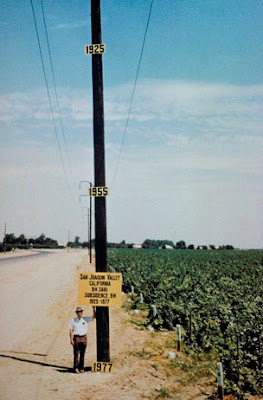Water in the West
The first is climate: to the east of the 100th meridian, America is moist, averaging over 30" of rainfall a year. To the west of the 100th, fewer than 20" of precipitation is recorded (that's an average which covers the extremes of the Southwestern desert and the northwestern coastal forests).

The second is time: the east was largely settled during the period from 1770 to 1870 when the federal government was simply focused on distributing the lands it owned. The west was settled during a period (1870-1973) when the government was attempting to more scientifically develop the lands under its jurisdiction. Almost all of the large hydroelectric and water project dams are in the West, for example. Without those projects--as well as federal investments in railroads and highways--the West would not have flourished as it has.
Since passage of the Endangered Species Act in 1973, the historical western competition for water rights between cities and agriculture has become a three-way struggle, with the environment itself given legal standing. And with the onset of climate change, the very models that the U.S. Army Corps of Engineers used when designing the West's dams, reservoirs, and water distribution systems are being challenged by declining precipitation and earlier snow melts.
Some interesting facts from the lecture:
- If current trends continue, by approximately 2040 the U.S. will be a majority western nation with more than half of the population in the western states.
- Already 1/3 of GDP and more than 1/2 of American exports to Asia come from the western states.
- Around 19% of the electricity used in California is used to move water, mostly from the wetter north to the dryer south.
- Desalination is unlikely to solve the West's water problem: it requires a lot of energy, would mostly only benefit the coast, and produces brine as a by-product which can't simply be dumped back in the ocean without affecting coastal aquatic habitats.
- Last year a study was published warning that there is a 50% chance that Lake Mead (the reservoir behind Hoover Dam) will be dry by 2021. The lake is a key source of water for Las Vegas, Arizona, and much of Southern California.
Professor Kennedy also flashed a frightening picture depicting one human impact on the West's landscape. Our unquenchable thirst for water, the vast majority of which goes to agriculture, has caused land in the West to subside... in some places to a shocking degree. Check out this U.S. Geological Service photograph which shows how far the ground has sunk in one location of the San Joaquin Valley between 1925 and 1977:

As I sat through the lecture, I wondered if the western population shift might provide the necessary political will to solve the West's water problems. The eastern U.S., especially the Great Lakes Region, has a lot of water to spare. The West has a big need for water, grows a lot of produce for the rest of the country (think California), and has vast potential for clean energy (and I just learned that the BLM reversed last year's decision to put a two year moratorium on new solar projects in Nevada, though the sinking economy is still an obstacle). Maybe with enough political power concentrated in the West some sort of agreement could be reached? But then I remembered the Senate: while the West's power will grow in the House of Representatives, the eleven states of the arid West will still have only 22 of 100 Senators.
(Kennedy was also interviewed on KNPR's "State of Nevada" yesterday.)
AND TO BOOKEND THE LECTURE, on my way home from the lecture I heard a report on NPR that federal water managers are stopping delivery of water to California farms, at least temporarily, due to drought conditions in the state.
Labels: climate change, economy, energy, environment, Las Vegas





2 Comments:
I think we have a future legally restrictive, economically and personally expensive future ahead of us. Water, energy, food, cars, &c will become almost prohibitively expensive.
( -1 "future" )
Post a Comment
<< Home